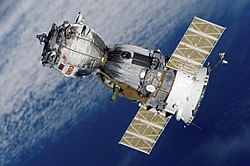Progress-M
 Progress M-47, a 11F615A55 model, as seen from the ISS | |
| Manufacturer | RKK Energia |
|---|---|
| Country of origin | USSR Russia |
| Operator | Roskosmos |
| Applications | Space station logistics |
| Specifications | |
| Regime | Low Earth |
| Design life | 180 days |
| Production | |
| Status | Retired |
| Built | 11F615A55: 67 11F615A60: 29 |
| Launched | 11F615A55: 67 11F615A60: 30 |
| Retired | 11F615A55: 67 11F615A60: 28 |
| Failed | 11F615A60: 1 |
| Lost | 11F615A60: 1 |
| Maiden launch | 11F615A55: 1989 (M-1) 11F615A60: 2008 (M-01M) |
| Last launch | 11F615A55: 2021 (M-UM) 11F615A60: 2015 (M-29M) |
| Last retirement | 11F615A55: 2021 (M-UM) 11F615A60: 2016 (M-29M) |
| Related spacecraft | |
| Derived from | Progress 7K-TG Soyuz-TM |
| Derivatives | Progress-M1 Progress MS |
| Configuration | |
 | |
Progress-M (Russian: Прогресс-М, GRAU indices 11F615A55 and 11F615A60), also known as Progress 7K-TGM, is a Russian (formerly Soviet) spacecraft used to resupply space stations. It is a variant of the Progress series, originally developed in the late 1980s as a modernized version of the Progress 7K-TG spacecraft. The Progress-M incorporated new systems derived from the Soyuz-T and Soyuz-TM spacecraft. The 11F615A60 variant introduced further upgrades, including the replacement of analog flight control systems with digital ones.
The first 43 Progress-M spacecraft were used to resupply Mir, with later missions supporting the International Space Station (ISS). A total of 87 Progress-M spacecraft were launched, 67 of the older 11F615A55 model and 30 of the newer 11F615A60 version. One spacecraft, Progress M-12M, was lost in a launch failure in August 2011. Another, M-27M, launched on 28 April 2015 but lost communication and control shortly after reaching orbit and re-entered Earth's atmosphere and burned up.[1]
The Progress M1 was a derivative of the Progress-M 11F615A55, optimized to carry more fuel at the expense of dry cargo and water. It entered service in 2000 and was retired in 2004. A modernized M1 incorporating upgrades from the 11F615A60 variant was scheduled to enter service in 2011, but the program was canceled before its first flight.
The final flight of a standard 11F615A55 was Progress M-67 in July 2009, while the final flight of the 11F615A60 was Progress M-29M in October 2015. It's replacement, the upgraded Progress MS spacecraft, flew for the first time in December 2015.
Several 11F615A55 spacecraft were specially modified into "space tugs" to deliver space station modules. Progress M-14 and M-38 were modified to deliver VDU attitude control systems to Mir in 1992 and 1998 respectively. Progress DC-1 delivered Pirs to the ISS in 2001, M-MIM2 delivered Poisk in 2009, and M-UM delivered Prichal in 2021.
See also
[edit]- Comparison of orbital spacecraft
- Automated Transfer Vehicle
- Cygnus spacecraft
- SpaceX Dragon
- H-II Transfer Vehicle
References
[edit]- ^ "Unmanned Russian spacecraft "plunging to Earth"". Yahoo News. 29 April 2015. Retrieved 29 April 2015.
External links
[edit]- Wade, Mark. "Progress M". Encyclopedia Astronautica. Archived from the original on 10 July 2009. Retrieved 19 June 2009.
- Krebs, Gunter. "Progress M1 -13, -15, -37, -39, -67 (11F615A55, 7KTGM)". Gunter's Space Page. Retrieved 19 June 2009.
- Krebs, Gunter. "Progress M-1M, M-10M (11F615A60, 7KTGM)". Gunter's Space Page. Retrieved 19 June 2009.

